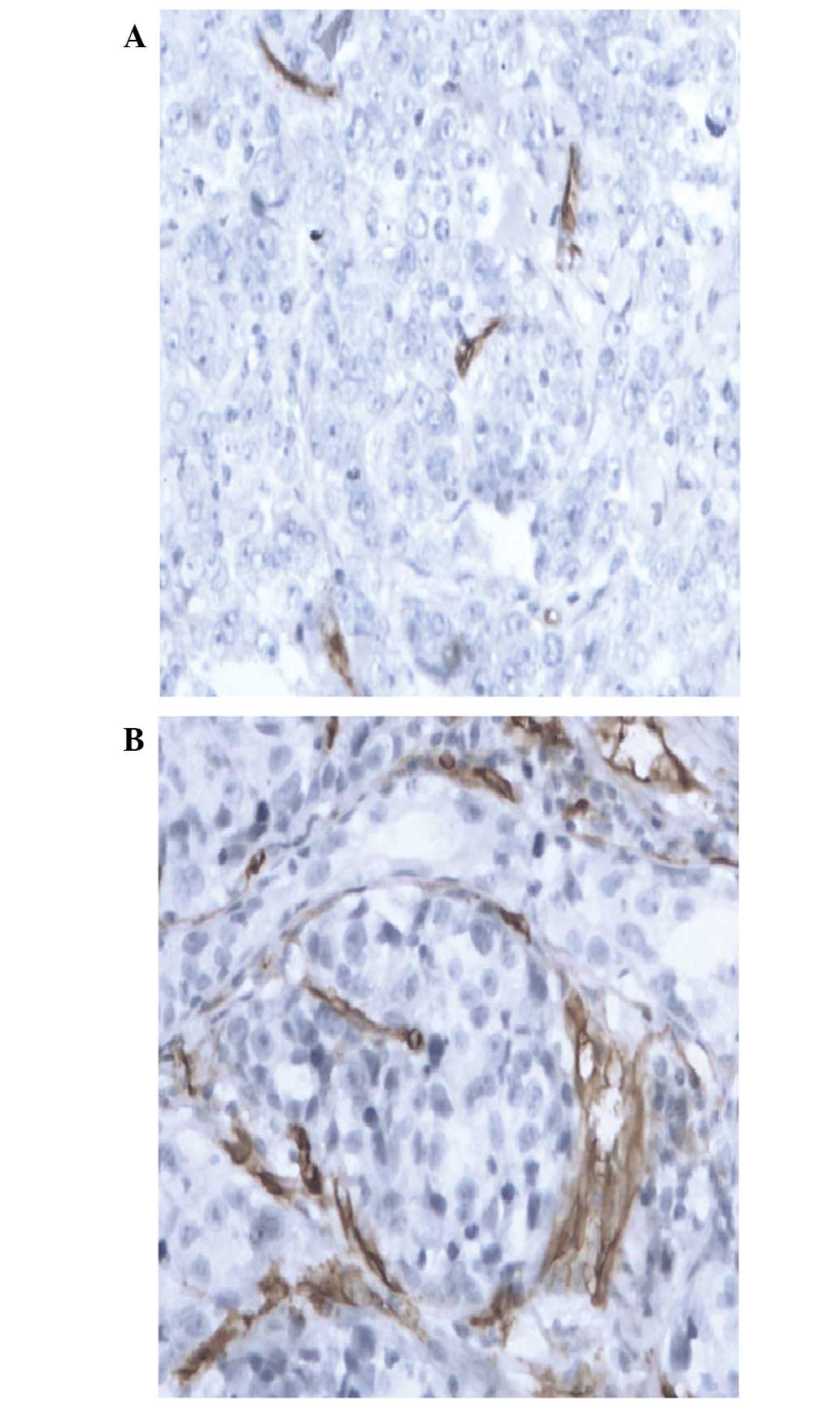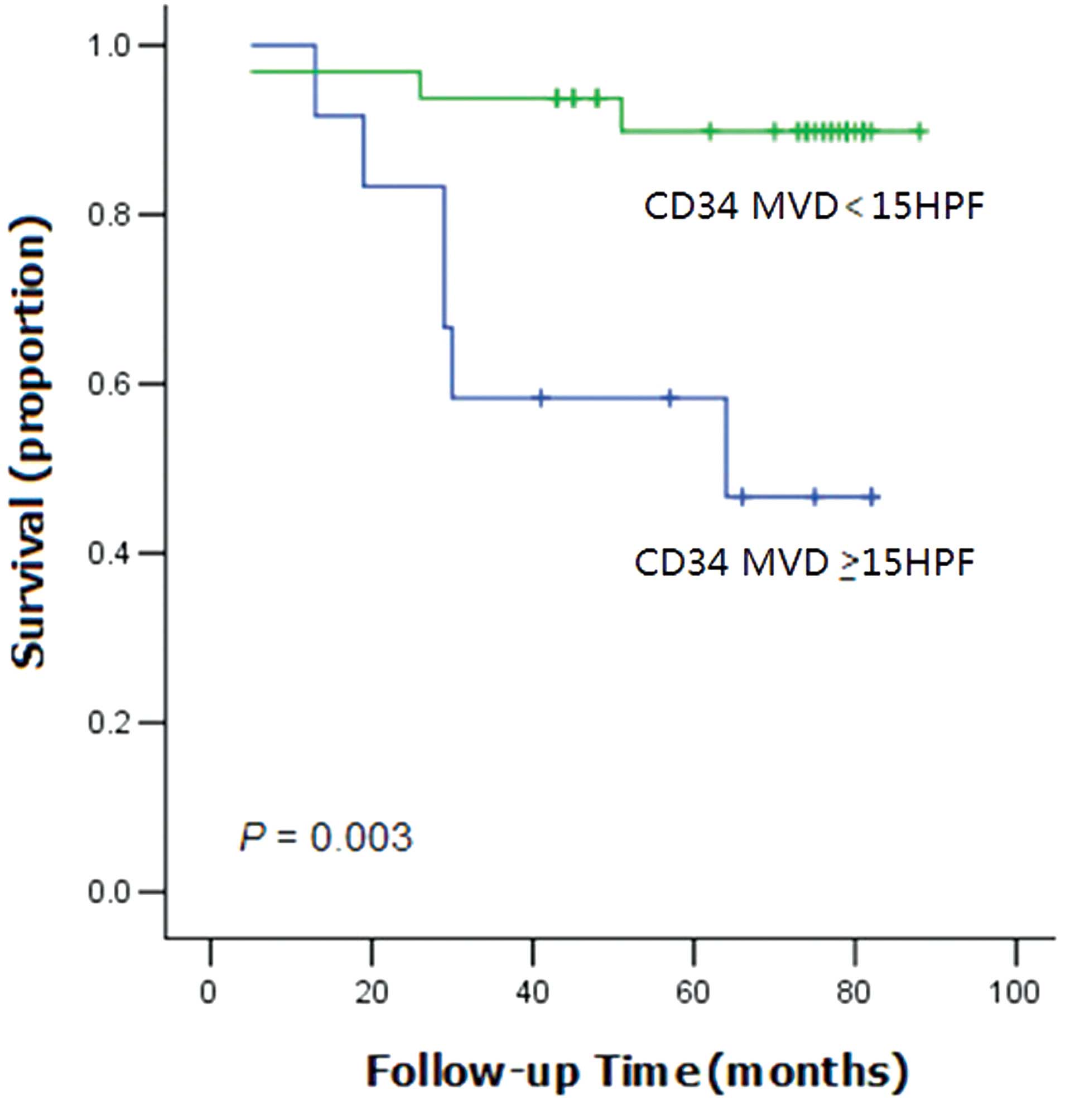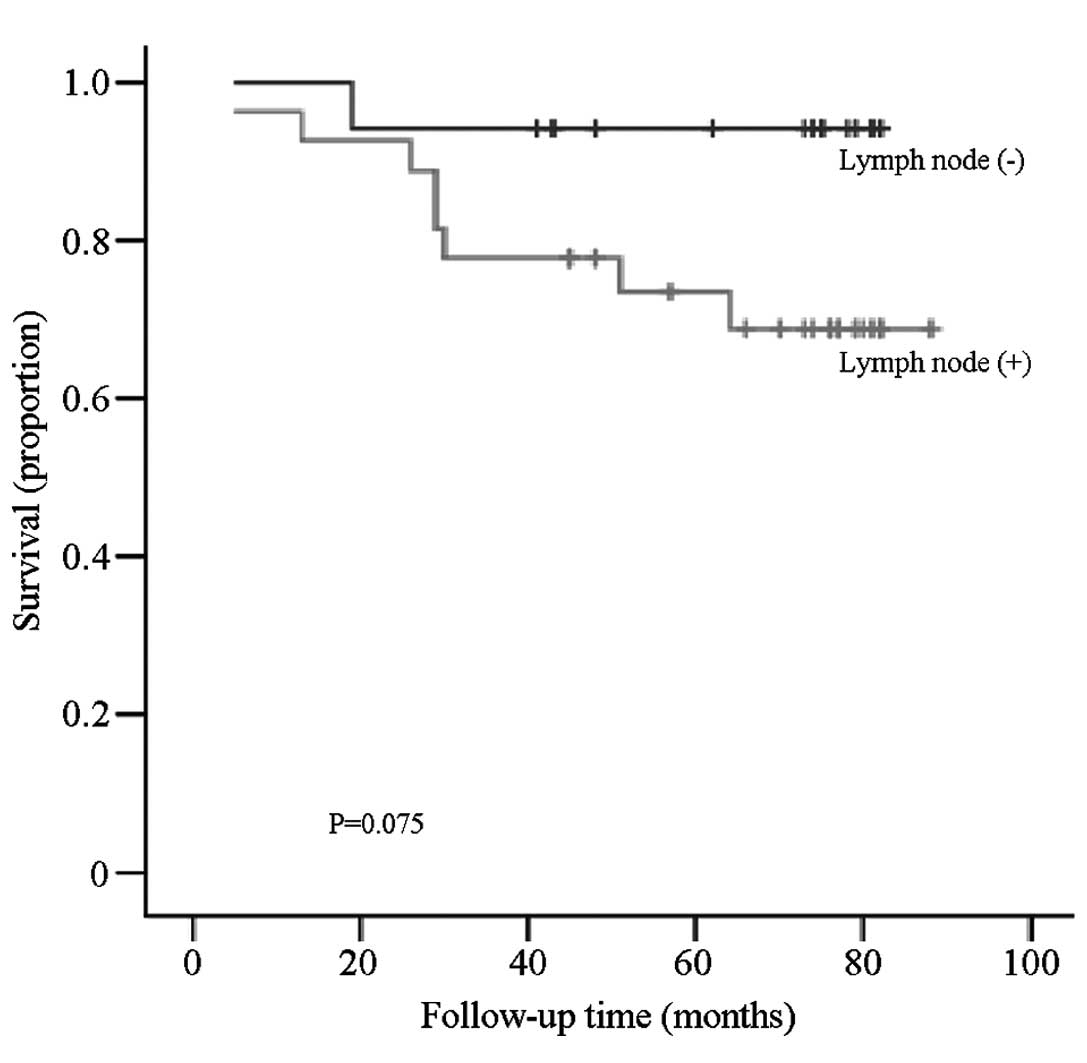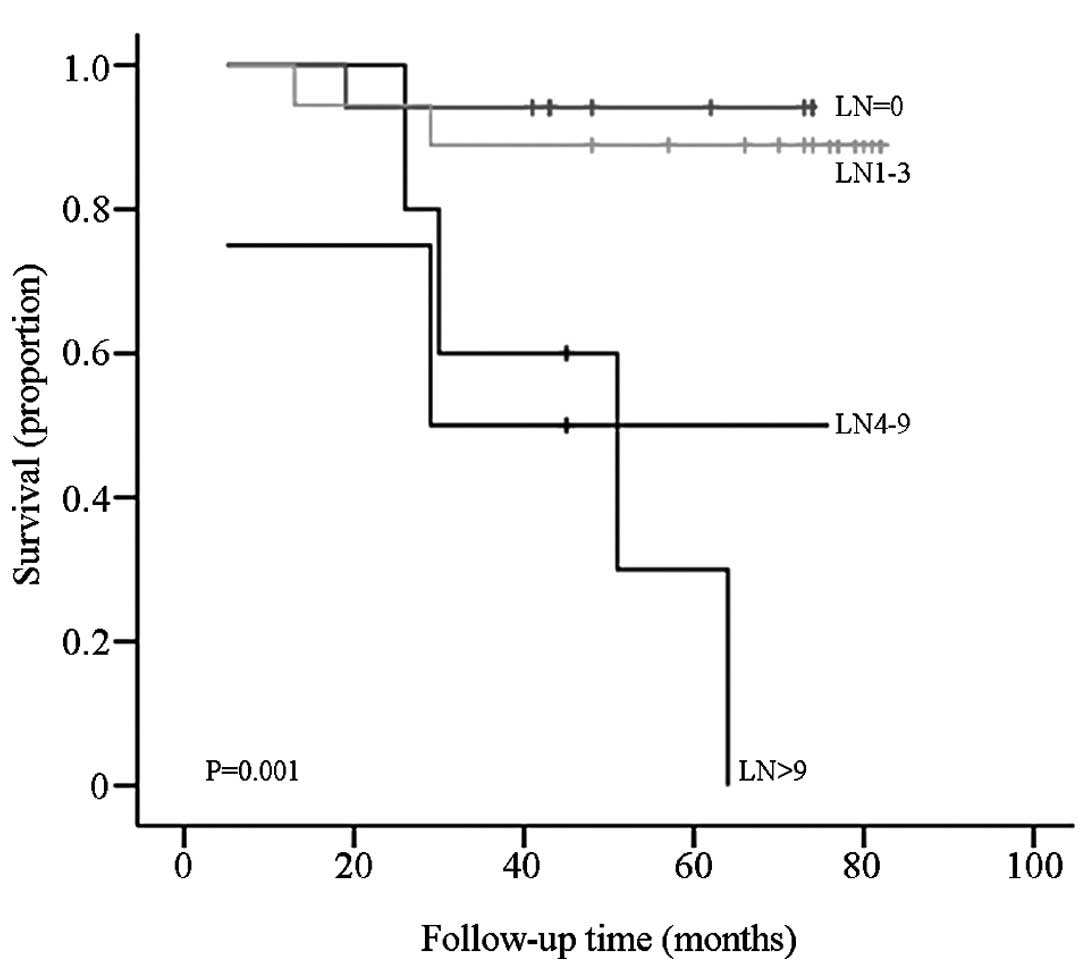|
1
|
Hanahan D and Folkman J: Patterns and
emerging mechanisms of the angiogenic switch during tumorigenesis.
Cell. 86:353–364. 1996. View Article : Google Scholar : PubMed/NCBI
|
|
2
|
Ziyad S and Iruela-Arispe ML: Molecular
mechanisms of tumor angiogenesis. Genes Cancer. 2:1085–1096. 2011.
View Article : Google Scholar : PubMed/NCBI
|
|
3
|
Cao Y, Zhang ZL, Zhou M, et al: Pericyte
coverage of differentiated vessels inside tumor vasculature is an
independent unfavorable prognostic factor for patients with clear
cell renal cell carcinoma. Cancer. 119:313–324. 2013. View Article : Google Scholar : PubMed/NCBI
|
|
4
|
Zorgetto VA, Silveira GG, Oliveira-Costa
JP, Soave DF, Soares FA and Ribeiro-Silva A: The relationship
between lymphatic vascular density and vascular endothelial growth
factor A (VEGF-A) expression with clinical-pathological features
and survival in pancreatic adenocarcinomas. Diagn Pathol.
8:1702013. View Article : Google Scholar : PubMed/NCBI
|
|
5
|
Horn LC, Schreiter C, Canzler A, Leonhardt
K, Einenkel J and Hentschel B: CD34(low) and SMA(high) represent
stromal signature in uterine cervical cancer and are markers for
peritumoral stromal remodeling. Ann Diagn Pathol. 17:531–535. 2013.
View Article : Google Scholar : PubMed/NCBI
|
|
6
|
Zhan H, Liang H, Liu X, Deng J, Wang B and
Hao X: Expression of Rac1, HIF-1α and VEGF in gastric carcinoma:
correlation with angiogenesis and prognosis. Onkologie. 36:102–107.
2013. View Article : Google Scholar : PubMed/NCBI
|
|
7
|
Sundov Z, Tomic S, Alfirevic S, et al:
Prognostic value of MVD, LVD and vascular invasion in lymph
node-negative colon cancer. Hepatogastroenterology. 60:432–438.
2013.PubMed/NCBI
|
|
8
|
Dhakal HP, Nesland JM, Førsund M, Trope CG
and Holm R: Primary tumor vascularity, HIF-1α and VEGF expression
in vulvar squamous cell carcinomas: their relationships with
clinicopathological characteristics and prognostic impact. BMC
Cancer. 13:5062013. View Article : Google Scholar : PubMed/NCBI
|
|
9
|
Anannamcharoen S and Nimmanon T: Study of
the vascular endothelial growth factor (VEGF) expression and
microvascular density (MVD) in primary colorectal cancer specimens.
J Med Assoc Thai. 95:1041–1047. 2012.PubMed/NCBI
|
|
10
|
Edge SB, Byrd DR, Compton CC, Fritz AG,
Greene FL and Trotti A: Breast CancerAJCC Cancer Staging Manual.
7th. Springer-Verlag; New York, NY: pp. 223–240. 2009
|
|
11
|
Weidner N: Current pathologic methods for
measuring intratumoral microvessel density within breast carcinoma
and other solid tumors. Breast Cancer Res Treat. 36:169–180. 1995.
View Article : Google Scholar : PubMed/NCBI
|
|
12
|
Keyhani E, Muhammadnejad A, Behjati F, et
al: Angiogenesis markers in breast cancer - potentially useful
tools for priority setting of anti-angiogenic agents. Asian Pac J
Cancer Prev. 14:7651–7656. 2013. View Article : Google Scholar : PubMed/NCBI
|
|
13
|
Satterthwaite AB, Burn TC, Le Beau MM and
Tenen DG: Structure of the gene encoding CD34, a human
hematopoietic stem cell antigen. Genomics. 12:788–794. 1992.
View Article : Google Scholar : PubMed/NCBI
|
|
14
|
Ch'ng ES, Tuan Sharif SE and Jaafar H:
Characteristics of invasive breast ductal carcinoma, NOS, diagnosed
in a tertiary institution in the East Coast of Malaysia with a
focus on tumor angiogenesis. Asian Pac J Cancer Prev. 13:4445–4452.
2012. View Article : Google Scholar : PubMed/NCBI
|
|
15
|
Murri AM, Hilmy M, Bell J, et al: The
relationship between the systemic inflammatory response, tumour
proliferative activity, T-lymphocytic and macrophage infiltration,
microvessel density and survival in patients with primary operable
breast cancer. Br J Cancer. 99:1013–1019. 2008. View Article : Google Scholar : PubMed/NCBI
|
|
16
|
Chuangsuwanich T, Pongpruttipan T,
O-Charoenrat P, Komoltri C, Watcharahirun S and Sa-Nguanraksa D:
Clinicopathologic features of breast carcinomas classified by
biomarkers and correlation with microvessel density and VEGF
expression: a study from Thailand. Asian Pac J Cancer Prev.
15:1187–1192. 2014. View Article : Google Scholar : PubMed/NCBI
|
|
17
|
Staton CA, Hoh L, Baldwin A, Shaw L, Globe
J, Cross SS, Reed MW and Brown NJ: Angiopoietins 1 and 2 and Tie-2
receptor expression in human ductal breast disease. Histopathology.
59:256–263. 2011.PubMed/NCBI
|
|
18
|
Davidson B, Stavnes HT, Førsund M, Berner
A and Staff AC: CD105 (Endoglin) expression in breast carcinoma
effusions is a marker of poor survival. Breast. 19:493–498. 2010.
View Article : Google Scholar : PubMed/NCBI
|
|
19
|
Zhao YC, Ni XJ, Li Y, Dai M, Yuan ZX, Zhu
YY and Luo CY: Peritumoral lymphangiogenesis induced by vascular
endothelial growth factor C and D promotes lymph node metastasis in
breast cancer patients. World J Surg Oncol. 10:1652012. View Article : Google Scholar : PubMed/NCBI
|
|
20
|
Acs G, Paragh G, Rakosy Z, et al: The
extent of retraction clefts correlates with lymphatic vessel
density and VEGF-C expression and predicts nodal metastasis and
poor prognosis in early-stage breast carcinoma. Mod Pathol.
25:163–177. 2012.PubMed/NCBI
|
|
21
|
Miller K, Wang M, Gralow J, et al:
Paclitaxel plus bevacizumab versus paclitaxel alone for metastatic
breast cancer. N Engl J Med. 357:2666–2676. 2007. View Article : Google Scholar : PubMed/NCBI
|
|
22
|
Miles DW, Chan A, Dirix LY, et al: Phase
III study of bevacizumab plus docetaxel compared with placebo plus
docetaxel for the first-line treatment of human epidermal growth
factor receptor 2-negative metastatic breast cancer. J Clin Oncol.
28:3239–3247. 2010. View Article : Google Scholar : PubMed/NCBI
|
|
23
|
Robert NJ, Diéras V, Glaspy J, et al:
RIBBON-1: randomized, double-blind, placebo-controlled, phase III
trial of chemotherapy with or without bevacizumab for first-line
treatment of human epidermal growth factor receptor 2-negative,
locally recurrent or metastatic breast cancer. J Clin Oncol.
29:1252–1260. 2011. View Article : Google Scholar : PubMed/NCBI
|
|
24
|
Gonçalves A, Deblock M, Esterni B, et al:
Docetaxel first-line therapy in HER2-negative advanced breast
cancer: a cohort study in patients with prospectively determined
HER2 status. Anticancer Drugs. 20:946–952. 2009. View Article : Google Scholar : PubMed/NCBI
|
|
25
|
Brufsky AM, Hurvitz S, Perez E, Swamy R,
Valero V, O'Neill V and Rugo HS: RIBBON-2: a randomized,
double-blind, placebo- controlled, phase III trial evaluating the
efficacy and safety of bevacizumab in combination with chemotherapy
for second-line treatment of human epidermal growth factor receptor
2-negative metastatic breast cancer. J Clin Oncol. 29:4286–4293.
2011. View Article : Google Scholar : PubMed/NCBI
|
|
26
|
Theriault RL, Carlson RW, Allred C, et al:
National Comprehensive Cancer Network: Breast cancer, version
3.2013: Featured updates to the NCCN guidelines. J Natl Compr Canc
Netw. 11:753–760. 2013.PubMed/NCBI
|
|
27
|
Huang H, Zheng Y, Zhu J, Zhang J, Chen H
and Chen X: An updated meta-analysis of fatal adverse events caused
by bevacizumab therapy in cancer patients. PLoS One. 9:e899602014.
View Article : Google Scholar : PubMed/NCBI
|
|
28
|
Ni X, Zhao Y, Ma J, Xia T, Liu X, Ding Q,
Zha X and Wang S: Hypoxia-induced factor-1 alpha upregulates
vascular endothelial growth factor C to promote lymphangiogenesis
and angiogenesis in breast cancer patients. J Biomed Res.
27:478–485. 2013. View Article : Google Scholar : PubMed/NCBI
|
|
29
|
Gao S, Ma JJ and Lu C: Prognostic
significance of VEGF-C immunohistochemical expression in breast
cancer: a meta-analysis. Tumour Biol. 35:1523–1529. 2014.
View Article : Google Scholar : PubMed/NCBI
|
|
30
|
Srabovic N, Mujagic Z,
Mujanovic-Mustedanagic J, Softic A, Muminovic Z, Rifatbegovic A and
Begic L: Vascular endothelial growth factor receptor-1 expression
in breast cancer and its correlation to vascular endothelial growth
factor a. Int J Breast Cancer. 2013:7467492013. View Article : Google Scholar : PubMed/NCBI
|


















